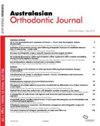金属过敏症患者下颌第二磨牙嵌塞的治疗
IF 0.9
4区 医学
Q4 DENTISTRY, ORAL SURGERY & MEDICINE
引用次数: 0
摘要
摘要金属超敏反应的发病率呈上升趋势,这一观点已被广泛接受。下颌第二磨牙未出牙的发生率为2.3%,其中0.2%为嵌塞所致。虽然在日常临床实践中治疗下颌阻生第二磨牙变得越来越普遍,但金属过敏患者以未出牙为表现却很少遇到。以前没有报道需要下颌磨牙牵引的患者也患有金属过敏。因此,这是第一个描述下颌第二磨牙脱嵌的长期稳定性的病例报告,导致患者满意度很高。本文章由计算机程序翻译,如有差异,请以英文原文为准。
Treatment of mandibular second molar impaction in a patient with metal hypersensitivity
Abstract It is widely accepted that the prevalence of metal hypersensitivity is increasing. Furthermore, the incidence of unerupted mandibular second molars is 2.3%, of which 0.2% is judged to be a result of impaction. While it is becoming more common to treat impacted mandibular second molars in daily clinical practice, metal hypersensitive patients presenting with unerupted molars are less frequently encountered. There have been no previous reports of patients who required mandibular molar traction and who also suffered from metal hypersensitivity. Therefore, this is the first case report to describe the long-term stability of mandibular second molar dis-impaction, leading to high level of patient satisfaction.
求助全文
通过发布文献求助,成功后即可免费获取论文全文。
去求助
来源期刊

Australasian Orthodontic Journal
Dentistry-Orthodontics
CiteScore
0.80
自引率
25.00%
发文量
24
期刊介绍:
The Australasian Orthodontic Journal (AOJ) is the official scientific publication of the Australian Society of Orthodontists.
Previously titled the Australian Orthodontic Journal, the name of the publication was changed in 2017 to provide the region with additional representation because of a substantial increase in the number of submitted overseas'' manuscripts. The volume and issue numbers continue in sequence and only the ISSN numbers have been updated.
The AOJ publishes original research papers, clinical reports, book reviews, abstracts from other journals, and other material which is of interest to orthodontists and is in the interest of their continuing education. It is published twice a year in November and May.
The AOJ is indexed and abstracted by Science Citation Index Expanded (SciSearch) and Journal Citation Reports/Science Edition.
 求助内容:
求助内容: 应助结果提醒方式:
应助结果提醒方式:


